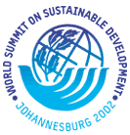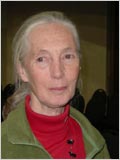Subject:
Jane Goodall, primatologist and conservationist.
How did you end up working with the chimpanzees of Gombe?
As a small child in England, I had this dream of going to Africa.
We didn't have any money and I was a girl, so everyone except my
mother laughed at it. When I left school, there was no money for me
to go to university, so I went to secretarial college and got a job.
But then, out of the blue, I was invited to Africa by a friend
whose parents had moved to Kenya. There I met Louis
Leakey, Richard Leakey's father, who suggested I should go and
study the chimps.
Nobody did that sort of thing in those days. I was a girl and I
didn't even have a degree. It took him over a year to find the
money, then he couldn't get permission from the authorities. And
then when I started the study, the chimps were very conservative and
just ran away every time they saw me. It was only as my first six
months was running out that I began to observe tool-using,
tool-making, hunting and sharing of food.
That was enough to bring National Geographic in and from then on
the research has been unbroken. The Gombe
Stream Research Centre's study is the longest of its kind in the
world.
What made your research distinctive?
Louis said I had to get a degree and that I didn't have time for
a BA: I'd have to go straight for a PHD. When I got to Cambridge
University, however, I was greeted with hostility. I'd given the
chimpanzees names instead of numbers. I'd dared to talk about them
having personalities, their ability to reason and the fact they had
emotions. These were cardinal sins.
It was only as more information accumulated that my approach was
accepted. Films showed the chimps' behaviour and people came to see
for themselves. The study - and those famous early chimpanzees -
have changed the way mainstream scientists think about animals.
So you're opposed to animal experimentation?
Yes. I believe science should and can move away from its reliance
on these experiments. It's not going to happen straight away, but
more and more alternatives are coming along.
We should say: what we're doing is unethical, so let's use our
considerable intellect to find a solution as soon as we possibly
can. Of course, intensive farming of animals is as bad as animal
experimentation - if not worse.
Can pro-animal conservation be pro-people as well?
For the last 11 years, we've run the TACARE
project around Gombie. It's improving the lives of the people and
makes them understand we care about them too. One reason, we've
never had poaching at Gombie is that local people have always helped
with the research. They know the chimpanzees better than I do. They
think of them as if they were humans.
What impact does tourism have?
Tourism is a two-edged sword. If you have too many people coming
into an area - and the ground rules are not sufficiently in favour
of animals and the environment - then tourism is a disaster.
However, I think we are beginning to see a new understanding. And
tourism saved the gorillas during the war in Rwanda. Each side
thought they were going to win and they wanted to protect the money
they knew the gorillas bought in.
What does sustainable development mean to you?
We can't leave people in abject poverty, so we need to raise the
standard of living for 80% of the world's people, while bringing it
down considerably for the 20% who are destroying our natural
resources.
The world's population also needs to come down. In the developing
world, you tend to have more people than the land can support. The
culture is changing here though. Once you had children so they could
look after you - now they go away, try and find a job, fail, come
home and you have to look after them.
It's all about education, of course. This is why we're concentrating
on educating women, providing scholarships for girls, and offering
micro-credit loans so that women can start environmentally
sustainable businesses and increase their self esteem.
And what do you make of the summit?
It's horrifying to think of the waste the summit will cause. All
these delegates having huge and fancy meals while so many people all
around are starving. It just doesn't make sense. But I have to be
here. Kofi Annan put me on his panel advising on sustainable
development. So I can't avoid being here.
How do you think change will happen?
Confrontation can be counter productive. Change happens by
listening and then starting a dialogue with the people who are doing
something you don't believe is right.
I am often accused of jumping into bed with the enemy - we work
with the timber industry, because of the trade in bush meat, and
some of the oil companies. You can't force change on people. Lasting
change is a series of compromises. And compromise is alright, as
long your values don't change.
26 August 2002 | 
